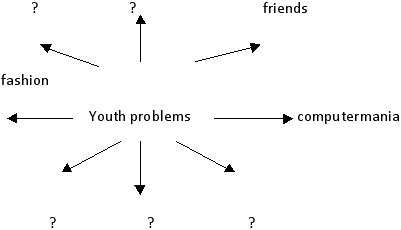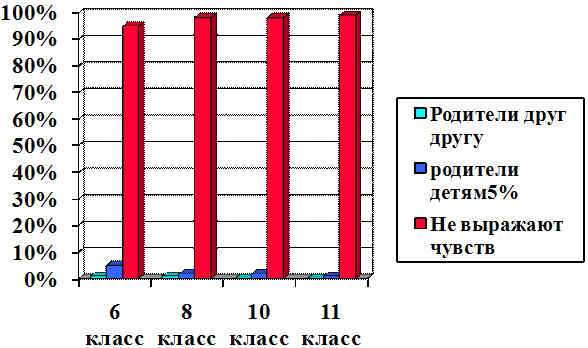Конспект урока «Generation gap» по английскому языку для 10 класса
Муниципальное бюджетное общеобразовательное учреждение Орловская средняя общеобразовательная школа №2
Учитель английского языка Дождикова Алла Ивановна
Урок английского языка в 10-м классе по теме "Generation gap"
Цель: развитие навыков толерантного отношения к людям, которые окружают подростков.
Задачи:
образовательные:
- развитие умения читать с полным охватом содержания текста;
- совершенствование лексических навыков.
Воспитательные:
- развитие социокультурной конкурентно-способной личности;
- формирование психически устойчивой личности, способной ориентироваться в трудной ситуации.
Развивающие:
- расширение познавательной активности обучающихся;
- развитие коммуникативных умений, навыков индивидуальной и групповой работы.
1. Организационный момент.
- My dear! The bell has already rung. It’s high time to begin our lesson. I’m very glad to see you.
- How are you?
- Can you say what date it is today?
- Do you know the origin of the word ‘February’?
(February comes from ‘februa’ which means cleansing or purification and reflects the rituals undertaken before spring)
- How do you find the weather today?
- Does your mood depend on weather?
2. Фонетическая зарядка.
- Listen to the short poem then repeat it in groups. Be attentive: it’ll help you in formulating the topic of our lesson.
When life gives you lemons – make lemonade
If life gives you strict teachers – thank them
If life gives you strict parents – obey them.
3. Коммуникативная разминка.
- What can make you nervous, annoyed, disappointed?
Students answers:
-
My clothes
-
Problems at school,
-
A quarrel with parents,
-
When a friend doesn’t want to understand,
-
When I can’t find a thing I need,
-
Lack of caring and sharing,
-
Too much caring,
-
When there are a lot of people in one house and you don’t have a chance to be alone, unseen or unheard.
- Can we regard all these complaints as problems?
- Look at the picture of a teen in the book p58 and say what his problems may be.
-
He might have fallen in difficult situation.
-
Probably he is disappointed in life.
-
Maybe he is drug-addicted.
-
He is alone in a modern violent world.
-
Perhaps he has conflicts with his family.
-
He is under influence of music.
4. Brainstorming. Formulating of the problem.
- What youth problems may be? Fill in the Word Web.

(cencorship, relations with opposite sex, lack of privacy, subcultures, youth pregnancy, difficulties with getting education and finding the job)
- Choose the problem which is the most serious alongside the others and taking into consideration the previous information formulate the problem of our discussion.
(The problem: What is the background of teens problems?)
5. Pre-text activities.
Look at the girl in the picture in your textbooks and describe her emotions. Use the adjectives from the box.
6. Pre-text exercises.
- Read the introduction and say what the girl’s problems may be.
(her parents don’t let her hang about with her friends, they punish her, they don’t let her go on dates, …….)
Now match the phrases 1-5 with phrases a-f that have the similar meaning.
|
7. Text activities.
Read Sasha’s letter to the youth magazine “Shout”
One of the worst things about my house is the lack of privacy. If I disappear into my room for some peace, it’s guaranteed that someone will come after me, wanting to know what I am up to. The thing is because I share a room with my little sister, I can’t just shut the door, and keep everyone out. She’s always complaining that’s it’s her room, too. Even worse, it means nothing is safe. I guess she goes through all my stuff, mucks about with my toiletries, and eats the sweets I keep in my room. If I want to keep anything secret I have to use lock.
I don’t know who I dislike more, my elder brother, who’s sixteen, or my younger one, who’s eleven. My older brother is a total creep. He pushes me around a lot and is always making nasty little comments about me. I hate being in the house alone with him. My little brother is just a geek. He asks me embarrassing questions about boys and stuff, and always shows me up in front of my friends. If I’m on the phone to one of my friends, he picks up the extension and listens in.
Although I’m 15, my parents treat me like a baby. They don’t let me out during the week and if I want to go to a friend’s house at the weekend, they phone up her parents and ask what time I’ll be at home. Dad always asks me about boys, warning me that I’m not allowed to go on real dates. He keeps nagging me about homework and studying. He thinks I/m lazy when I sit watching the telly at night.
The other thing that bugs me is that I’m treated like an unpaid slave in the house. I have to do the dishes, help with ironing… I wouldn’t object to this if everyone in the house did their fair share, but my brothers only keep there room clean, and my sister just acts like a baby. Mum tells me that she needs the help and I’m the best at doing housework, but that’s because I’m the only one who does it!
I’m going to leave home as soon as I’m old enough. It would be great if I could get a job and a flat when I leave school. I wish I just had one tiny room of my own. My mates always say that I’ll miss my family once I leave , but I doubt that!
- Working in groups write out the reasons of Sasha’s conflicts
-
With her little sister
-
With her brothers
-
With Sasha’s parents
- What is the background of misunderstanding in Sasha’s family?
(after discussing students come to the conclusion: the roots of Sasha’s problems are conflicts in her family based on misunderstanding)
8. After-text activities
- Can you explain why in some cases Continuous form is used with ‘always’ instead of Simple
(to express the idea of ‘very often’, ‘too often’)
- Use the Present Continuous + ‘always’ to describe people you know.
9. Relaxation.
Sit comfortably. Close your eyes. Breath in. Breath out. Let’s suppose it’s summer. You are lying on a sandy beach. The weather is fine. The light wind is blowing from the sea. The birds are singing. You have no troubles. You are quite. Your brain relaxes. There is calm in your body. Nothing diverts your attention. You are relaxing. You troubles float away. You love your relatives, school, friends. They love you too. You are in good spirits. Open your eyes. How do you feel?
10. Listening.
- Listen to the text and choose the corresponding sentences.
…..I’m a 17-year-old student who needs advice. I live with my family and study at the university. With my beloved boy I met a year ago when I was at school. We are good friends and even more we are going to be together forever. We enjoy being in love.
My problem is that my parents don’t like my boyfriend/ They are very strict and think that I’m too young to have serious relations. They don’t allow me to go on dates and even don’t want to hear about him. My parents make my life miserable. I get very depressed. I keep my stuff in a suitcase to leave my home in a suitable moment.
11. Summing up.
- What is necessary to avoid misunderstanding?
(mutual love)
- Look through the results of the survey among the students. The question under discussion was: “Do your parents often say you ‘I love you?”
- According to the survey among young people about expressing love in their families
- 1% noticed that their parents say each other “I love you, my honey” in front of their children
- 2% say that their parents say this phrase in front of their friends.
- 97% prefer not to show their feelings.

12. Conclusion:
Students come to a conclusion: “A difficult child is a child who is unhappy”. To be happy means to be loved, to be heard, to be treated as equal.
The main idea of the lesson:
Love each other and everything will be OK. All obstacles will be overcome and all the gentle words will be found and this cruel world will turn to you with a kind smile. Your mother’s smile, your father’s smile, your smile…
13. Homework
Write a letter about your problems to an agony column on the site.
-
www.dogdikova. Narod.ru
-
Send your e-mail Vlad10@yandex.ru
Литература:
-
С.В.Кульневич, Т.П.Лакоценина “Современный урок” (проблемные уроки)
-
“Методика обучения иностранным языкам в средней школе.” Модернизация общего образования. –Изд-во “Каро”, Санкт-Петербург, 2006
Здесь представлен конспект к уроку на тему «Generation gap», который Вы можете бесплатно скачать на нашем сайте. Предмет конспекта: Английский язык (10 класс). Также здесь Вы можете найти дополнительные учебные материалы и презентации по данной теме, используя которые, Вы сможете еще больше заинтересовать аудиторию и преподнести еще больше полезной информации.

